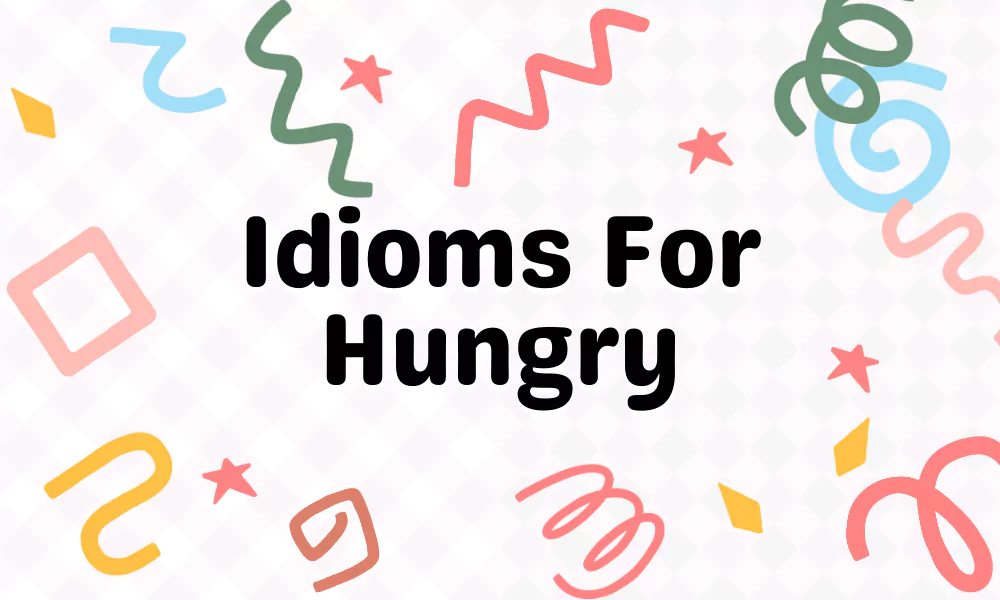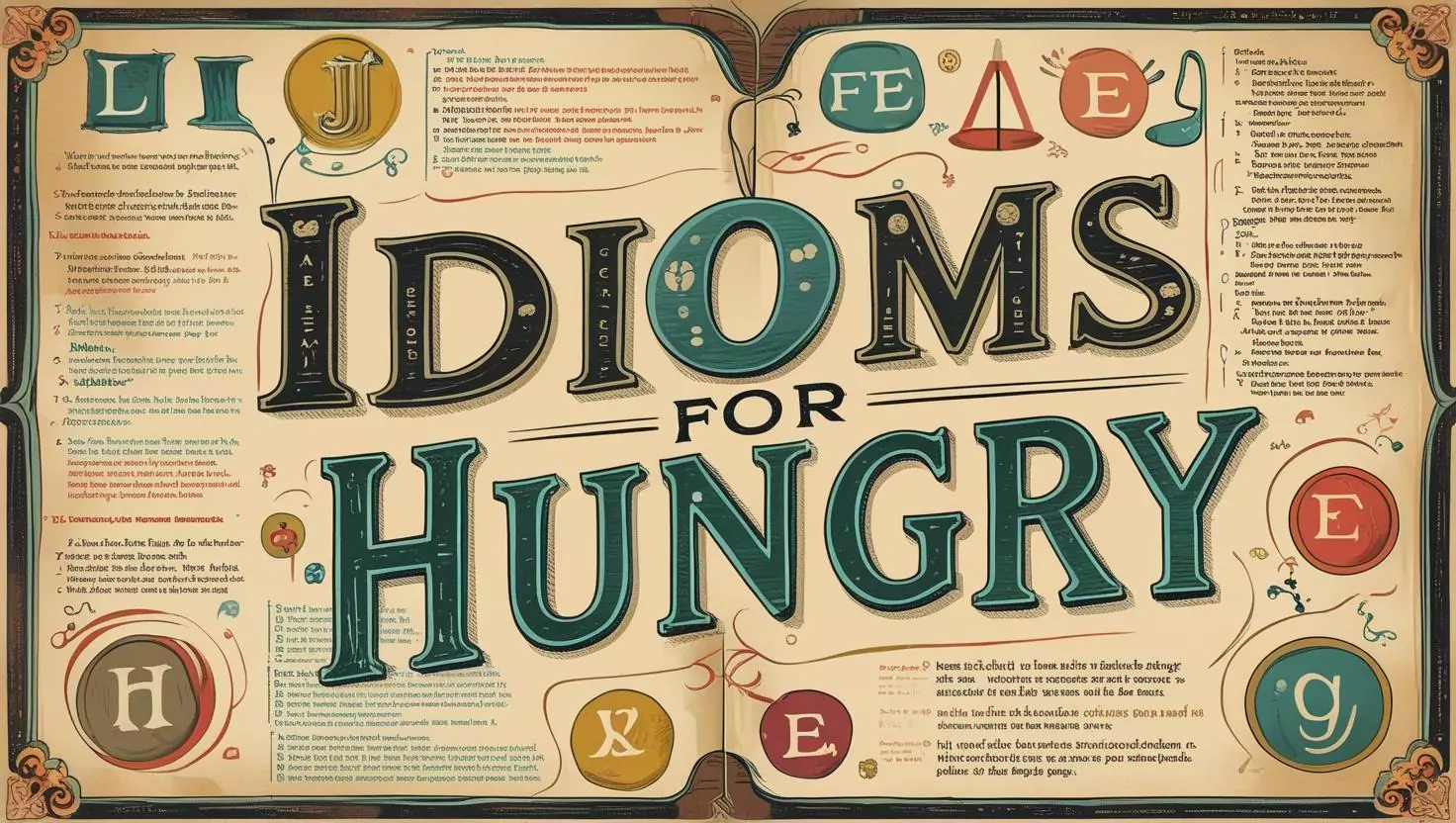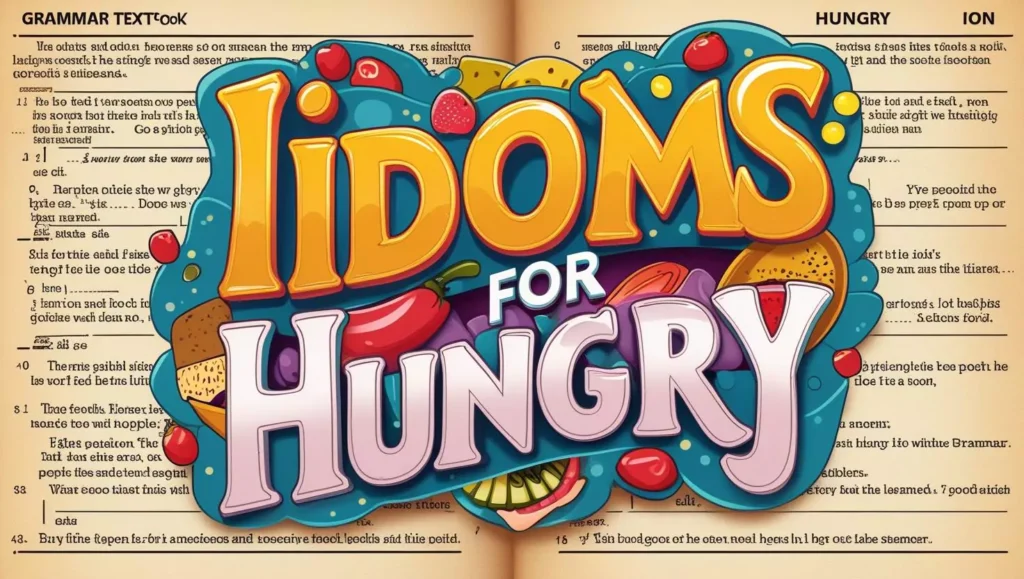Idioms for Hungry – Expressing Hunger with Colorful English Phrases

Hunger is more than just an empty stomach, it’s an experience that everyone can relate to. In English, we often use idioms to describe that feeling in a colorful and memorable way. Instead of simply saying “I’m hungry,” you can make your words come alive with expressions like “I could eat a horse” or “my stomach is growling.” These idioms add humor, drama, and personality to everyday conversations, making your language sound more natural and engaging. For English learners, mastering these expressions is a great way to build confidence, improve fluency, and speak with flair.
What Are Idioms for Hungry?
Idioms for hungry are everyday expressions that describe the feeling of needing or craving food in a more imaginative way. Instead of saying “I am hungry,” people often use colorful phrases like “I’m starving,” “I could eat a horse,” or “my stomach is growling.” These idioms don’t mean their literal words but they use figurative language to create a stronger picture or emotion. Learning these phrases helps English learners sound more natural, fluent, and expressive in conversations.

Commonly Used Idioms for Hungry
- I’m starving – Extremely hungry.
Example: I skipped breakfast, and now I’m starving. - Hungry as a wolf – Very hungry.
Example: After the long hike, we were all hungry as wolves. - Eat like a horse – Eat a lot.
Example: Don’t worry about the food; my brother eats like a horse. - Eat like a bird – Eat very little.
Example: She’s so slim because she eats like a bird. - My stomach is growling – Stomach making sounds of hunger.
Example: Sorry, that’s my stomach growling, I need lunch. - I could eat a horse – Extremely hungry.
Example: After the exam, I could eat a horse! - Peckish – Slightly hungry.
Example: I’m a bit peckish; let’s grab a snack. - Work up an appetite – Become hungry after activity.
Example: We worked up an appetite playing soccer. - Running on empty – Low on energy from hunger.
Example: I haven’t eaten all day so I’m running on empty. - Have the munchies – Craving snacks.
Example: After the movie, we all had the munchies. - A hollow leg – Someone who can eat a lot.
Example: My cousin must have a hollow leg because he never gets full. - Wolf down food – Eat quickly and hungrily.
Example: He wolfed down his lunch in minutes. - Gobble up – Eat quickly.
Example: The kids gobbled up the cookies. - Famished – Extremely hungry.
Example: I’m famished after that long meeting. - Ravenous – Very hungry.
Example: By dinnertime, we were ravenous. - Belly is empty – Very hungry.
Example: I need food; my belly is empty. - Eat someone out of house and home – Eat a lot at someone else’s expense.
Example: Teenagers can eat you out of house and home. - Starve to death – Very hungry.
Example: Hurry up with dinner; I’m starving to death. - Hunger pangs – Sharp feeling of hunger.
Example: I woke up in the night with hunger pangs. - Eat up a storm – Eat a lot.
Example: They ate up a storm at the buffet. - Make a pig of oneself – Eat greedily.
Example: He made a pig of himself at the party. - Eat like there’s no tomorrow – Eat excessively.
Example: On holidays, people eat like there’s no tomorrow. - Build up an appetite – Activity makes you hungry.
Example: Gardening builds up an appetite. - Devour – Eat hungrily.
Example: She devoured her pizza in minutes. - Bolt down food – Eat quickly.
Example: He bolted down his breakfast before school. - Eat someone alive – Eat a lot (figurative exaggeration).
Example: These mosquitoes eat me alive; I need food too! - Gnawing hunger – Deep, persistent hunger.
Example: The gnawing hunger kept him awake. - Eating spree – Eating excessively.
Example: They went on an eating spree at the festival. - Stomach rumbling – Audible hunger sign.
Example: My stomach’s rumbling, so it’s time for lunch. - Eat for two – Eating a lot (often said about pregnant women).
Example: She’s eating for two now. - Bottomless pit – Someone who never gets full.
Example: My teenage son is a bottomless pit. - Feed the beast – Satisfy extreme hunger.
Example: Let’s feed the beast before I get cranky. - Food coma – Sleepy after eating a lot.
Example: Thanksgiving dinner always puts me in a food coma. - Hunger like a lion – Very hungry.
Example: After football practice, I was hungry like a lion. - Chow down – Eat with enthusiasm.
Example: We chowed down on burgers at the diner. - Eat like a king – Eat a luxurious or big meal.
Example: We ate like kings at the wedding. - Snack attack – Sudden craving for snacks.
Example: I had a snack attack at midnight. - Feed one’s face – Eat a lot.
Example: They were feeding their faces at the barbecue. - Stuff one’s face – Eat greedily.
Example: We stuffed our faces with cake. - Hankering for food – Strong craving.
Example: I have a hankering for pizza tonight. - Eat on the go – Eating while busy.
Example: He always eats on the go before work. - Grab a bite – Have a quick meal.
Example: Let’s grab a bite after work. - Pig out – Eat too much.
Example: We pigged out on snacks during the movie. - Eat one’s fill – Eat until satisfied.
Example: Guests ate their fill at the buffet. - Eat like a trucker – Eat large portions.
Example: She eats like a trucker but never gains weight. - Hunger for food – Strong desire.
Example: He had a hunger for fast food after practice. - Eat till you drop – Eat excessively.
Example: The buffet encouraged us to eat till we dropped. - Breaking bread – Sharing a meal.
Example: Breaking bread together creates friendships. - Eat hearty – Eat well and fully.
Example: The campers ate hearty meals after hiking. - Eat in moderation – Control food intake.
Example: Doctors advise to eat in moderation.
Rare and Unique Idioms for Hungry
- Hungry as a hunter – Extremely hungry.
Example: The workers came back hungry as hunters. - Hunger gnaws like a rat – Constant hunger.
Example: The hunger gnawed like a rat inside him. - Appetite is the best sauce – Food tastes better when hungry.
Example: He enjoyed the soup, appetite is the best sauce. - Hungry belly has no ears – Hard to listen when hungry.
Example: He ignored advice; a hungry belly has no ears. - Hunger drives the wolf from the wood – Hunger forces action.
Example: He accepted the job; hunger drives the wolf from the wood. - Hungry as a bear in spring – Very hungry.
Example: She was hungry as a bear after fasting. - Hungry eyes – Looking longingly at food.
Example: He had hungry eyes staring at the cake. - Feed the belly, silence the tongue – Eating calms complaints.
Example: They served dinner quickly so feed the belly, silence the tongue. - Gnaw one’s vitals – Hunger causing pain.
Example: The hunger gnawed his vitals all night. - As empty as a drum – Completely hungry.
Example: My stomach is as empty as a drum. - Eat the paint off the walls – Eat excessively.
Example: Those boys could eat the paint off the walls. - Hunger makes the best cook – Food feels better when starving.
Example: Plain bread tasted delicious, hunger makes the best cook. - Hunger has no law – Desperation justifies breaking rules.
Example: He stole bread, hunger has no law. - Hungry as a hawk – Very hungry.
Example: The athletes were hungry as hawks after the race. - Eat nails, if offered – Desperate hunger.
Example: He was so hungry he’d eat nails if offered. - Lean hunger – Harsh, pressing hunger.
Example: The lean hunger of poverty haunted them. - Hunger sharpens wit – Hunger makes you resourceful.
Example: He found a solution so hunger sharpens wit. - Food for worms – Extreme hunger/death reference.
Example: He joked he was food for worms without dinner. - Belly’s master – Hunger controls behavior.
Example: The soldier obeyed his belly’s master. - Eat crow – To suffer humiliation (linked with hunger in origin).
Example: He had to eat crow after losing the bet.
Hungry Idioms in Literature and Pop Culture
- Bread and circuses – People satisfied with food/entertainment (Roman origin).
Example: The movie gave the audience bread and circuses. - A loaf of bread, a jug of wine, and thou – Famous literary line about hunger/desire.
Example: He quoted Omar Khayyam: “a loaf of bread, a jug of wine, and thou.” - Eat the rich – Pop culture phrase about class hunger.
Example: The punk band screamed, “Eat the rich!” - Feed me, Seymour! – Line from Little Shop of Horrors.
Example: He imitated the plant saying, “Feed me, Seymour!” - Food for thought – An idea to consider.
Example: That speech gave us food for thought. - Hunger Games – Pop culture symbol of survival hunger.
Example: She compared exams to the Hunger Games. - Bite-sized pieces – Manageable amounts (modern media phrase).
Example: The tutorial broke lessons into bite-sized pieces. - Eating one’s own dog food – Companies using their own product.
Example: Tech firms often eat their own dog food. - Hungry like the wolf – Song lyric (Duran Duran).
Example: He sang, “I’m hungry like the wolf.” - Feed the world – From Do They Know It’s Christmas?
Example: The charity aimed to feed the world. - Breaking bread together – Biblical/literary reference.
Example: They broke bread as a sign of peace. - Man cannot live by bread alone – Biblical saying.
Example: He quoted, “Man cannot live by bread alone.” - Sweet tooth – Desire for sweets.
Example: He’s got a sweet tooth for chocolate. - The last supper – Biblical/literary cultural phrase.
Example: They joked about their meal being the last supper. - Hungry ghosts – From Asian folklore & literature.
Example: He studied the tale of hungry ghosts. - To eat the apple – Biblical reference (temptation).
Example: She warned him not to eat the apple. - Give us this day our daily bread – Prayer line.
Example: He whispered, “Give us this day our daily bread.” - An army marches on its stomach – Napoleon’s quote.
Example: He reminded them an army marches on its stomach. - Eat, drink, and be merry – Biblical/literary idiom.
Example: They lived by the phrase: eat, drink, and be merry. - All you can eat – Pop culture phrase.
Example: We went to an all-you-can-eat buffet.

Tips for Using Hungry Idioms in Writing and Speech
- Match the Idiom with the Intensity of Hunger – Not all idioms express the same level of hunger. Use “peckish” when you’re slightly hungry, but choose “I could eat a horse” when you want to exaggerate extreme hunger. Picking the right idiom makes your language more accurate and natural.
- Use Idioms to Add Humor or Drama – Hungry idioms often sound playful or dramatic, which makes conversations more engaging. For example, saying “my stomach is eating itself” is more entertaining than just saying “I’m very hungry.”
- Adapt Idioms to Fit Your Storytelling – Idioms work best when woven into real-life situations. In writing, instead of simply stating hunger, show it through an idiom: “After running five miles, he wolfed down his dinner.” This paints a vivid picture for the reader.
- Don’t Overuse Idioms in One Sentence – While idioms add color, using too many at once can confuse the listener or reader. Keep it natural, drop one or two idioms into a conversation or paragraph instead of stacking them together.
- Practice Idioms in Everyday Contexts – To sound fluent, practice idioms in simple daily situations. For example, when lunch is late, say “My stomach is growling.” Or after a big party, say “We pigged out last night.” Using them in real-life conversations will make them stick.
Read: Idioms for Difficult
Synonyms and Alternatives for Hungry
| Synonyms | Meanings |
|---|---|
| Starving | Extremely hungry; feeling as though you have not eaten for a very long time. |
| Famished | Very hungry, often used in both casual and formal English. |
| Ravenous | Extremely hungry, with a strong and urgent desire for food. |
| Peckish | Slightly hungry; having a small appetite. (British English) |
| Hollow | Describes a deep empty feeling in the stomach due to hunger. |
| Voracious | Having a huge appetite; eager to eat a lot. |
| Empty | Having nothing in the stomach, creating the sensation of hunger. |
| Starved | Severely deprived of food; extremely hungry. |
| Gluttonous | Excessively greedy for food. |
| Appetent (rare/academic) | Having a strong craving or desire for food. |
FAQs
Conclusion
Hunger is a universal feeling, but English gives us countless colorful ways to describe it. From everyday idioms like “I’m starving” or “I could eat a horse” to rare expressions like “hunger is the best sauce” and cultural references such as “The Hunger Games,” these phrases bring humor, drama, and vivid imagery into our conversations.
For English learners, mastering hungry idioms not only expands vocabulary but also helps in sounding more fluent and natural. Whether you’re writing creatively, practicing conversations, or simply trying to add flavor to your speech, these idioms make language more expressive and fun. Remember to use them in context, match them to the level of hunger, and enjoy how they bring life to everyday communication.
